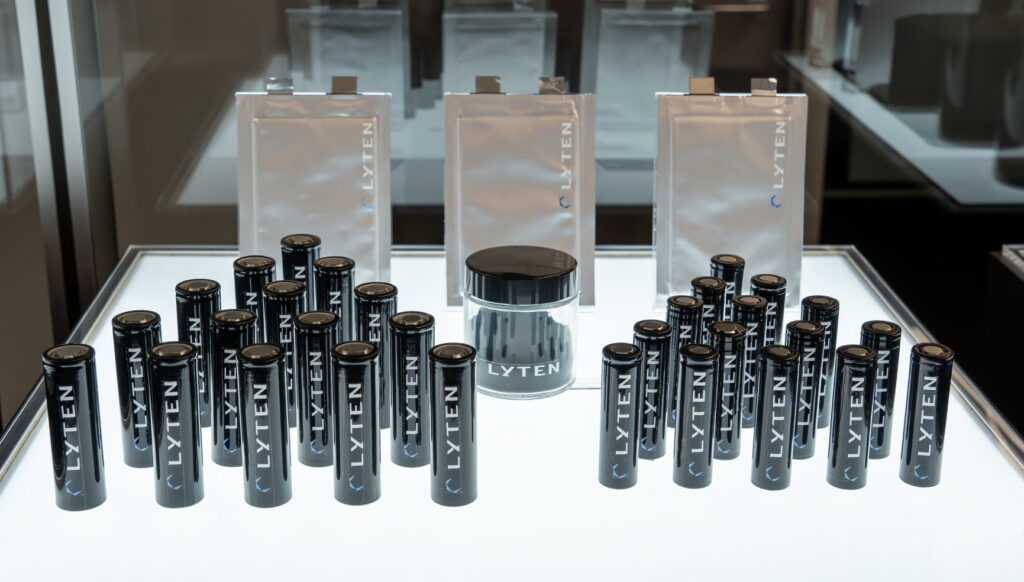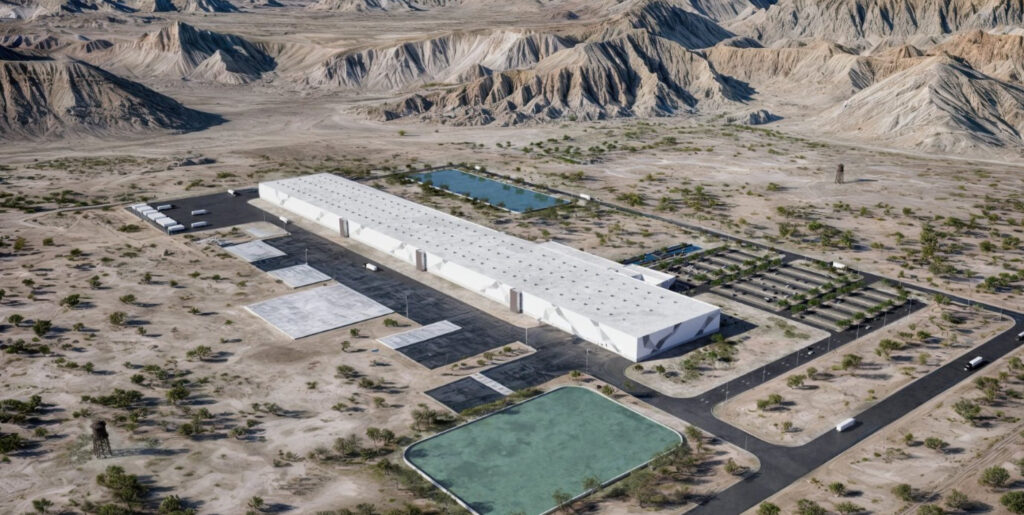
A display showing Lyten’s Lithium-Sulfur batteries. (Photo: Business Wire)
The financing would be used to scale the company’s Silicon Valley and Reno, Nevada factories and supply the batteries to rapidly growing international markets.
SAN JOSE, Calif., and WASHINGTON—Lyten, a super-material applications company that develops and manufactures lithium-sulfur batteries, recently received multiple Letters of Interest (LOI) from the Export-Import Bank of the United States (EXIM). The LOIs support a funding package of up to $650 million to expand lithium-sulfur battery manufacturing in Silicon Valley and in Reno, Nevada, and to deliver the batteries to international customers, according to a release from Lyten.
The mission of the Export-Import Bank, the official export credit agency of the U.S. Federal Government, is to support U.S. jobs by facilitating the export of American goods and services. One of the agency’s objectives includes strengthening America’s supply chains through its “Make More in America” initiative.
Financing for Lyten would support EXIM’s mandate to accelerate U.S. competitiveness in Transformational Export Areas (TEAs), as well as EXIM’s commitment to deepen U.S. economic ties in the Caribbean. The Export-Import Bank is reported to have current exposure to US$34 billion in lending across 148 countries around the world (2023 Annual Report). The default rate across the portfolio is 0.98 percent, reflecting the high standards of credit required to obtain EXIM financing, Lyten said in the release.
Lyten recently announced the location of the world’s first lithium-sulfur battery gigafactory in Reno, Nevada. The facility is scheduled to come online in 2027 and reach 10 GW annually at full capacity. In November, Lyten announced the acquisition of Northvolt’s battery manufacturing facility in San Leandro, California, which Lyten intends to ramp up for commercial sales in the second half of 2025.
“We are thrilled to work with EXIM as a financial partner to scale U.S. lithium-sulfur manufacturing to meet rapidly growing global customer demand,” said Lyten Co-Founder and CEO Dan Cook, in the release. “Lyten’s Lithium-Sulfur batteries are a U.S. innovation and rely on a U.S. materials supply chain. The San Leandro and Reno factories will make the U.S. the world’s leading manufacturer and exporter of lithium-sulfur batteries.”

A rendering of Lyten’s Lithium-Sulfur Facility in Reno, Nevada (Photo: Business Wire)
Lyten’s Lithium-Sulfur battery cells have higher energy density and are up to 50 percent lighter than current lithium-ion batteries. The company’s cathode, anode, and cells are fully manufactured in the U.S. from abundantly available local materials, eliminating the need for mined minerals like nickel, cobalt, manganese, and graphite. Lyten’s use of low-cost, local materials makes Lyten lithium-sulfur a lower-cost and higher-performing battery than lithium-ion at scale, the company said.
The Export-Import Bank and Lyten are working together to finalize financing terms to support multiple Lyten customer MOUs [memoranda of understanding] for supplying battery energy storage systems (BESS). The systems would be supplied to Trinidad and Tobago, and other Caribbean Community and Common Market (CARICOM) nations, from the recently acquired San Leandro facility.
Lyten’s planned BESS offering uses the unique properties of lithium-sulfur to deliver superior temperature range performance, low self-discharge rate, and ultra-light weight for distributed BESS deployments in challenging geographies, the release stated.
“Tropical regions make up 40 percent of the world’s population and are the fastest growing population base on the planet,” said Lyten Chief Battery Technology Officer Celina Mikolajczak, in the release. “The growing energy demand within these regions increasingly relies on solar power generation, but current lithium-ion battery technology to store that energy does not perform well in hot conditions, making efficient storage of that energy challenging. Lithium-sulfur’s performance actually improves in hot conditions, making it a perfect solution for energy storage in the global south.”
Investors in Lyten include Stellantis, FedEx, Honeywell, Prime Movers Lab, the Walbridge Group, Luxembourg Future Fund, and the European Investment Fund. Lyten has an ongoing Joint Development Agreement with Stellantis.
In 2024, Lyten reported that it partnered with defense manufacturer AEVEX Aerospace to demonstrate lithium-sulfur battery powered unmanned air vehicles (UAVs) that are fully compliant with the 2024 National Defense Authorization Act (NDAA). The company also recently announced that its battery cells were “selected for demonstration aboard the International Space Station (ISS) in 2025 for use in a wide range of space applications.”
Lyten is currently commercializing next-generation lithium-sulfur batteries for use in transportation, aerospace, space, consumer electronics, and energy storage markets. The company is also commercializing next-generation high strength, low carbon footprint composites; and next-generation sensors that are reported to significantly increase detection sensitivity and selectivity for use in environmental, automotive, industrial, health, and supply chain applications.
Lyten’s proprietary processes permanently sequester carbon from methane in the form of 3D Graphene. The company uses the tunable supermaterial to develop decarbonizing applications.
The Export-Import Bank of the United States is the official export credit agency of the United States of America. It is an independent Executive Branch agency with a mission of supporting American jobs by facilitating the export of U.S. goods and services.
